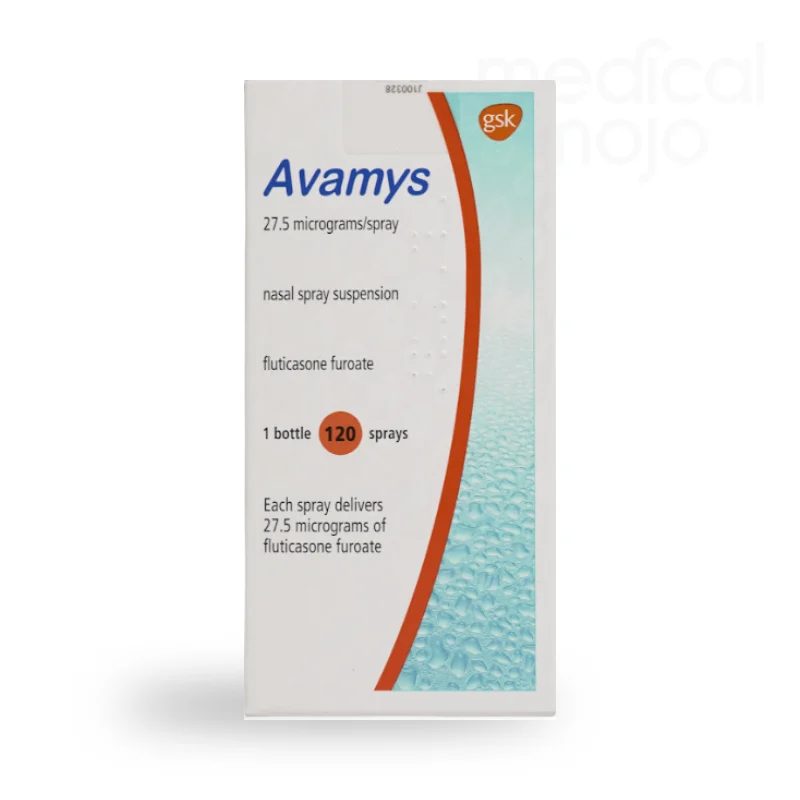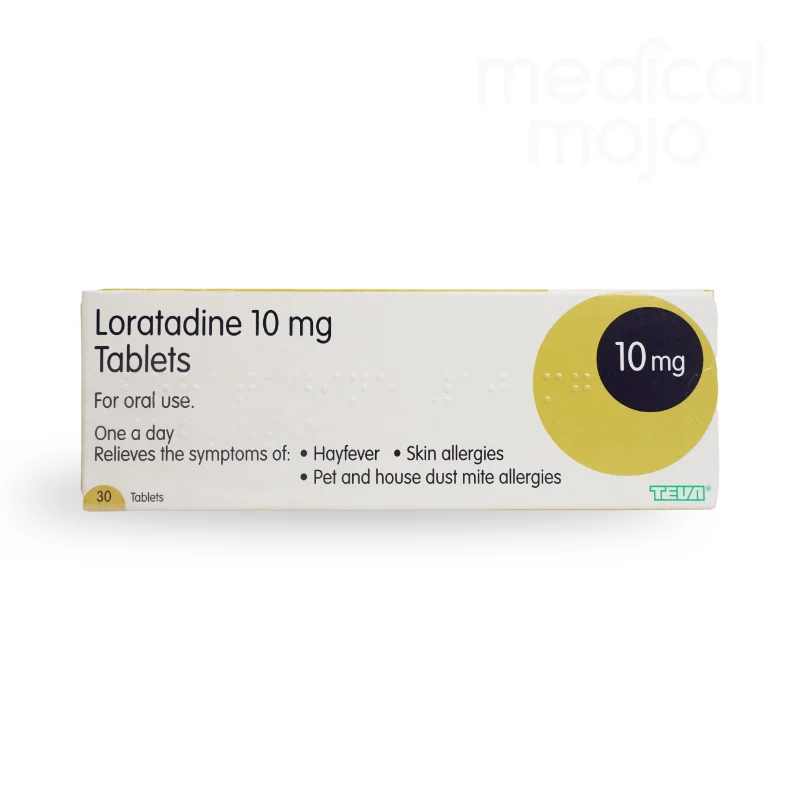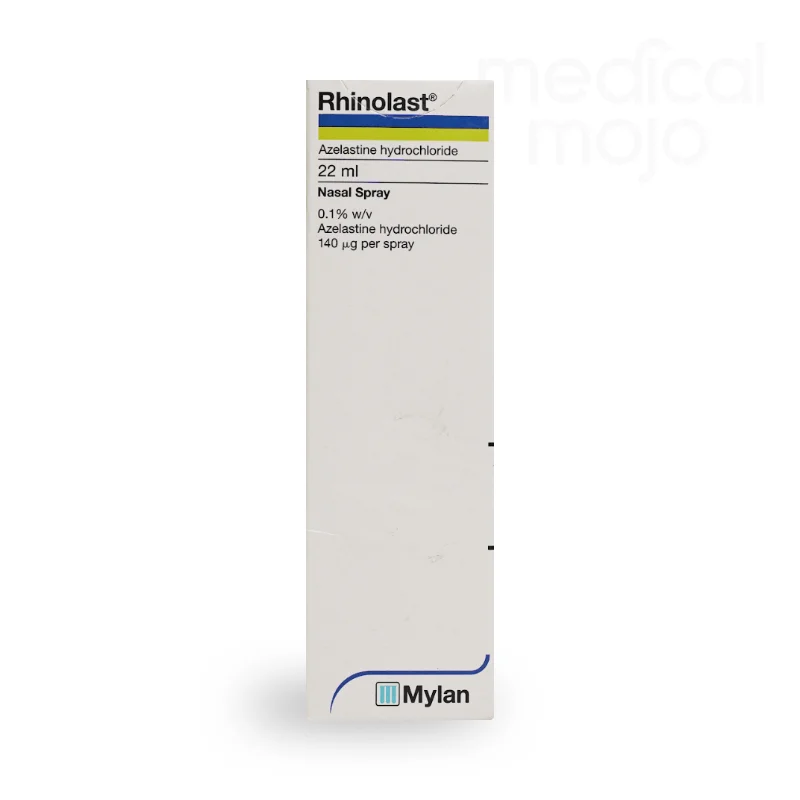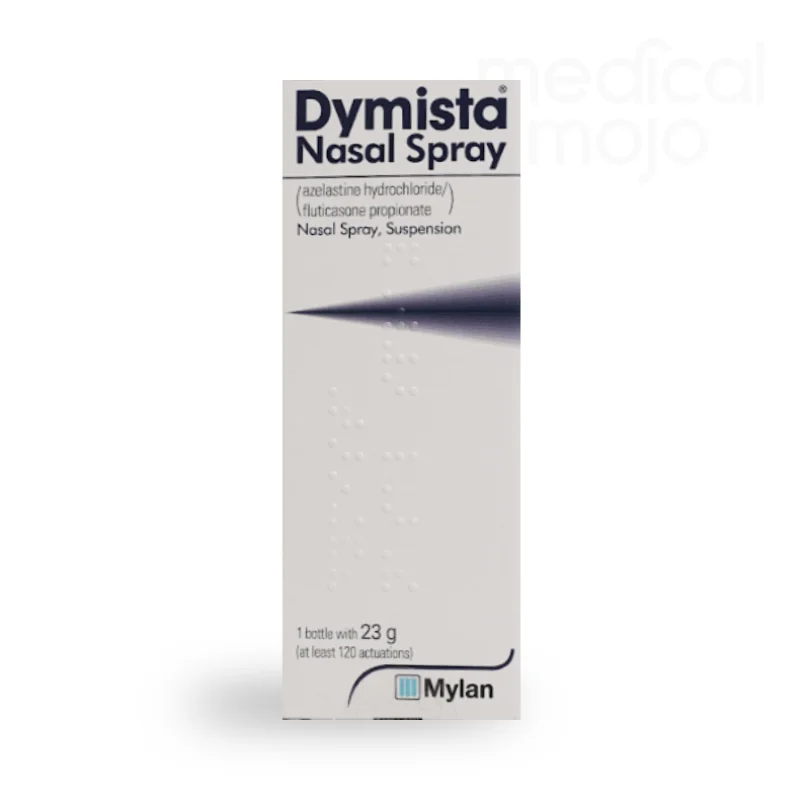What is Avamys nasal spray?
Avamys nasal spray is a prescription medication designed to treat hay fever and other allergic conditions. It contains fluticasone furoate, a corticosteroid that helps reduce inflammation in the nasal passages caused by allergens such as pollen, pet dander, and dust mites.
By alleviating nasal inflammation, Avamys effectively manages symptoms of allergic rhinitis, including nasal congestion, a runny or itchy nose, sneezing, and itchy, watery eyes.
Produced by GlaxoSmithKline, Avamys nasal spray provides about 120 doses per bottle (based on the standard starting dose) and is suitable for use by adults and children aged 6 years and older.
What is the active ingredient in Avamys nasal spray?
Avamys contains the active ingredient of fluticasone furoate (27.5 micrograms per spray).
What is Avamys nasal spray used for?
Avamys nasal spray effectively alleviates symptoms of seasonal allergic rhinitis (hay fever), such as nasal congestion, sneezing, a runny nose, and itchy, watery, or red eyes. For use, simply administer the spray into each nostril as needed, aiming for gentle application. Typically used once or twice daily, the fine mist quickly reduces inflammation, clears your airways, and relieves discomfort.
In addition to hay fever, this steroid nasal spray is also effective against allergies triggered by other irritants, including pet dander and house dust.
How does Avamys nasal spray work?
Avamys nasal spray works by reducing inflammation in the nasal passages to alleviate symptoms of allergic rhinitis. Here’s how it functions:
- Active Ingredient: Avamys contains fluticasone furoate, a corticosteroid that targets inflammation.
- Anti-Inflammatory Action: Fluticasone furoate works by suppressing the immune response that causes inflammation in the nasal tissues. This helps reduce swelling, redness, and irritation in the nasal passages.
- Symptom Relief: By decreasing inflammation, the spray effectively relieves common symptoms of allergies such as nasal congestion, sneezing, a runny nose, and itchy or watery eyes.
- Application: When sprayed into the nostrils, the fine mist of Avamys coats the nasal lining. Regular use (typically once or twice daily) ensures consistent control of inflammation and symptom relief.
Overall, Avamys helps manage allergic reactions by targeting the underlying inflammatory process, providing relief from the discomfort associated with allergies.
How do you use Avamys nasal spray?
Always use Avamys exactly as prescribed by your doctor or pharmacist. Do not exceed the recommended dosage. If you are unsure about how to use it, consult your doctor or pharmacist.
When to use Avamys
- Apply once daily.
- Aim to use it at the same time each day to maintain consistent symptom relief throughout the day and night.
How long Avamys takes to work
- You may not experience the full benefits immediately. While it often works within 8 to 24 hours, some people might need several days to feel the complete effects.
Dosage recommendations
- Adults and Children Aged 12 and Over:
- Start with two sprays in each nostril once daily.
- Once symptoms are controlled, you might reduce to 1 spray in each nostril daily.
- Children Aged 6 to 11 Years:
- Start with 1 spray in each nostril once daily.
- If symptoms are severe, your doctor might increase the dose to 2 sprays in each nostril daily until symptoms improve, then potentially reduce it to 1 spray in each nostril daily.
How to use the nasal spray
Avamys nasal spray has a virtually neutral taste and odour. It should be administered as a fine mist into your nostrils. Avoid getting the spray in your eyes; if this happens, rinse your eyes with water immediately.
For detailed instructions on how to use the nasal spray, refer to the step-by-step guide located after Section 6 of this leaflet. Following these instructions carefully will help you get the most benefit from Avamys.
If you use more Avamys than recommended
Consult your doctor or pharmacist for advice if you have used more than the prescribed amount.
If you miss a dose
If you forget to use Avamys, take the missed dose as soon as you remember. If it is almost time for your next dose, skip the missed dose and continue with your regular schedule. Do not double up on doses to make up for a missed one.
For any additional questions or concerns about using Avamys or if you experience any discomfort, contact your doctor, pharmacist, or nurse.
Who should not use Avamys nasal spray?
Allergy warning
Do not use Avamys if you are allergic to fluticasone furoate or any of the other ingredients listed in the patient information leaflet.
Warnings and precautions
- Children and Adolescents:
- Avamys should not be used in children under 6 years old.
- Long-term use may affect growth in children. Your doctor will monitor your child's height regularly and ensure they are on the lowest effective dose.
- Prolonged use may lead to eye conditions such as glaucoma (increased eye pressure) or cataracts (clouding of the lens). Inform your doctor if you have a history of these conditions or if you experience blurred vision or other visual disturbances while using Avamys.
Pregnancy and breastfeeding
If you are pregnant, breastfeeding, suspect you might be pregnant, or are planning to have a baby, consult your doctor before using Avamys. Do not use Avamys during pregnancy or while breastfeeding unless advised by your doctor or pharmacist.
Driving and operating machinery
Avamys is unlikely to impair your ability to drive or operate machinery.
Ingredients in Avamys
Each spray of Avamys contains 8.25 micrograms of benzalkonium chloride (27.5 micrograms). Benzalkonium chloride may cause nasal irritation or swelling, especially with prolonged use. Notify your doctor or pharmacist if you experience discomfort while using the spray.
What are the side effects with Avamys nasal spray?
Like all medications, Avamys can cause side effects, although not everyone experiences them.
Allergic reactions: seek immediate medical attention
Allergic reactions to Avamys are rare, affecting fewer than 1 in 1,000 people. In a small number of cases, these reactions can escalate to a serious, potentially life-threatening condition if untreated. Symptoms to watch for include:
- Severe wheezing, coughing, or difficulty breathing
- Sudden feelings of weakness or light-headedness, which may lead to collapse or loss of consciousness
- Swelling of the face
- Skin rashes or redness
While these symptoms are often signs of less severe side effects, it's important to be aware of their potential seriousness. If you experience any of these symptoms, contact a doctor immediately.
Very common side effects (may affect more than 1 in 10 people)
- Minor nosebleeds, especially with continuous use of Avamys for more than 6 weeks.
Common side effects (may affect up to 1 in 10 people)
- Nasal ulceration, which may cause discomfort or irritation in the nose and may result in streaks of blood when blowing your nose.
- Headache
- Shortness of breath
Uncommon side effects (may affect up to 1 in 100 people)
- Pain, burning, irritation, soreness, or dryness inside the nose
Very rare side effects (may affect up to 1 in 10,000 people)
- Small perforations in the nasal septum (the ridge inside the nose that separates the nostrils)
Unknown frequency (frequency cannot be estimated from available data)
- Slowed growth in children
- Blurred vision or temporary vision changes with long-term use
- Chest tightness, leading to breathing difficulties
Nasal corticosteroids can impact the normal hormone production in your body, particularly with long-term use of high doses. In children, this may result in slower growth compared to their peers.
Reporting side effects
If you experience any side effects, speak with your doctor, pharmacist, or nurse. This includes any potential side effects not listed in this leaflet. You can also report side effects directly through the Yellow Card Scheme, which helps gather more information on the safety of this medicine.
United Kingdom
Yellow Card Scheme
Website: www.mhra.gov.uk/yellowcard
Or search for "MHRA Yellow Card" in the Google Play or Apple App Store.
Does Avamys nasal spray interact with other medicines?
Inform your doctor or pharmacist if you are currently taking, have recently taken, or plan to take any other medications, including those available without a prescription. It's particularly crucial to mention if you are using or have used any of the following:
- Oral or injectable steroids
- Steroid creams
- Asthma medications
- Ritonavir or cobicistat, for HIV treatment
- Ketoconazole, for fungal infections
Your doctor will determine if Avamys is safe to use alongside these medications. They may also want to monitor you closely as these medications can amplify Avamys' side effects. Avoid using Avamys simultaneously with other nasal sprays that contain steroids.
Avamys nasal spray FAQs
What is Avamys nasal spray?
Avamys nasal spray is a prescription medication used to treat hay fever and other allergies. It contains fluticasone furoate, which helps reduce inflammation in the nasal passages caused by allergic reactions to pollen, animals, and house dust. This steroid-based spray can effectively alleviate symptoms like nasal congestion, a runny or itchy nose, sneezing, and itchy, watery eyes. Manufactured by GlaxoSmithKline, each bottle contains around 120 sprays and is suitable for adults and children aged 6 years and older.
What is Avamys nasal spray used for?
Avamys nasal spray is used to reduce the symptoms of seasonal allergic rhinitis (hay fever), such as nasal congestion, sneezing, runny nose, and watery, itchy, or red eyes. It can also relieve symptoms caused by other allergens like pet hair or house dust. The spray is applied to each nostril once or twice daily to quickly reduce inflammation and soothe discomfort.
How does Avamys nasal spray treat allergic rhinitis?
Avamys nasal spray contains fluticasone furoate, a corticosteroid with strong anti-inflammatory properties. It works by reducing the swelling in the nasal mucosa that occurs during an allergic reaction, thereby alleviating symptoms like itchiness, sneezing, and a runny nose. The spray is effective against nasal allergies throughout the year.
How quickly does Avamys nasal spray work?
Avamys nasal spray typically begins to reduce hay fever symptoms within 8 hours of application, reaching its full effect after a few days of use. Initially, you may use two sprays per nostril each day, reducing to one spray per nostril once symptoms are under control. Continue using Avamys as long as you're exposed to allergens.
What are the alternatives to Avamys nasal spray?
If you prefer not to use a fluticasone furoate nasal spray, there are alternative treatments for allergic rhinitis, such as antihistamine tablets, eye drops, and non-steroid nasal sprays. Some common options include:
- Hay fever tablets: Chlorphenamine, Piriteze, Zirtek.
- Eye drops: Opticrom, Optilast, Optrex.
- Non-steroid nasal sprays: Nasacort, Beconase, Benacort.
You may want to try these over-the-counter treatments before seeking a prescription for Avamys.
How do I use Avamys nasal spray?
The recommended starting dose for Avamys nasal spray is 2 sprays in each nostril per day. Once your symptoms are under control, you can reduce this to 1 spray per nostril per day. For children aged 6 to 11 years, the usual dose is 1 spray per nostril daily, but this may be increased to 2 sprays per nostril if symptoms are severe.
To use the spray:
- Gently blow your nose if comfortable.
- Shake the bottle well.
- Tilt your head slightly forward.
- Insert the nozzle into one nostril, aiming it away from the nasal septum.
- Squeeze the nozzle while breathing in through your nose.
- Repeat for the other nostril.
If you have difficulty breathing through the treated nostril, you can close the other nostril with a finger while applying the spray.
What are the ingredients in Avamys nasal spray?
Avamys contains the active ingredient fluticasone furoate (27.5 micrograms per spray). Inactive ingredients include glucose anhydrous, dispersible cellulose, polysorbate 80, benzalkonium chloride, disodium edetate, and purified water.
What are the possible side effects of Avamys nasal spray?
Side effects from using Avamys are uncommon but can include:
- Nosebleeds
- Nasal ulcers
- Headaches
- Nasal irritation or soreness
In rare cases, Avamys may cause thrush. If side effects persist or you experience any adverse reactions, stop using the nasal spray and consult your doctor for alternative treatments.
What warnings should I be aware of when using Avamys nasal spray?
Avamys is not recommended for children under 6 years old. Before using Avamys, inform your doctor or pharmacist if you are taking other medications, have a history of cataracts or glaucoma, or if you experience any vision changes while using the spray. Also, be aware that benzalkonium chloride, an inactive ingredient, may cause nasal irritation.
Can I use Avamys nasal spray with other medications?
If you are taking protease inhibitors (like ritonavir), other corticosteroid medicines, or certain antifungal treatments (like ketoconazole), consult your doctor before using Avamys nasal spray, as it may not be advisable to combine these medications.
Is Avamys nasal spray safe during pregnancy or breastfeeding?
If you are pregnant, planning to become pregnant, or currently breastfeeding, consult your doctor before using Avamys nasal spray to ensure it is safe for you and your baby.











